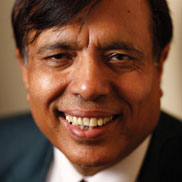As BMA deputy chair, retired GP Dr Kailash Chand is one of the heavy-weight hitters of the profession, and he has had to defend general practice from what seemed like constant attacks this year.
He has had to take the Government to task over extreme funding pressures, a recruitment and retention crisis and patient care ‘being compromised by an NHS which is close to breaking point’ this year.
After the health secretary Jeremy Hunt proposed naming and shaming GPs for missed cancer diagnoses, he responded with calls to ‘stop GP bashing’ and instead invest in general practice.
He also challenged NICE guidance promoting the use of statins, calling it a ‘victory for vested interest over evidence’ and criticised Government plans to charge migrants for NHS care.
Dr Chand says his aim is to ‘to shine a light on the unprecedented pressure facing the NHS in general, and general practice in particular’. Although, sometimes he has to tread a very fine line.
He is quick to highlight the damaging effects of the Health and Social Care Act – he warns that if no one speaks up for the NHS as we know it ‘will be gone in as little as five years’ – but he has also acted to strengthen the relationship between GPs and commissioners.
He says: ‘We want to support doctors playing a greater role in commissioning services. As part of this I led two successful seminars which brought together leaders from CCGs, NHS England and the NHS Confederation to discuss how best to commission services which would meet not just the physical needs, but also the mental and social needs of a local community, with an emphasis on preventative care.’
A frequent columnist for national newspapers, most notably The Guardian, he is clear that no matter what this election year will bring, he is focused on what it means for patients.
He says: ‘The NHS is always changing, successive governments will attempt to put down their own markers, trying to shape the structures and ethos of the NHS according to their own outlook and ideology. A good doctor focuses on delivering the best possible care for their patients. The rest is secondary.’
Related links
Politicians must stop producing gimmicky health policies
Dr Kailash Chand: ‘Charging patients is not the answer’
Charging migrants to use the NHS will cost more than it saves
Pulse October survey
Take our July 2025 survey to potentially win £1.000 worth of tokens














